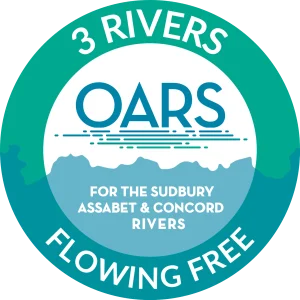PRESS RELEASE: Urgent Call for Action on Hager Pond Dam: Algal Blooms and Ecological Damage Threaten Hop Brook
August 09, 2024
by Sarah Kwan, Director of Communications & Development, OARS | August 9, 2024
FOR IMMEDIATE RELEASE
Marlborough, MA—August 9, 2024—The Hager Pond Dam in Marlborough, MA, has become a focal point of environmental concern, with experts pointing to its significant role in creating hazardous conditions in Hager Pond and downstream in Hop Brook. The extreme harmful algal blooms (HABs), foul odors, and widespread ecological damage have led to growing calls for the removal of the dam to restore the health of the waterway.

Environmental Crisis: Hager Pond and Hop Brook Suffer from Dam Impacts
Recent observations have documented severe conditions in Hager Pond, with experts noting a dense, bright, fluorescent green algal bloom that has spread miles downstream. Water samples reveal a very high likelihood that cyanobacteria, a harmful toxin-producing algae, dominates this bloom. The situation is exacerbated by dangerously high pH levels exceeding 10, which signal probable cyanobacteria dominance.
One of the more alarming consequences is the oxygen saturation in the pond, which has reached levels over 300%, far beyond the 150% threshold considered harmful to aquatic life. This supersaturation can be lethal to fish and other aquatic organisms, further degrading the ecosystem.
OARS, the watershed organization for the Sudbury, Assabet, and Concord rivers, has been monitoring these conditions and attributes the crisis to the Hager Pond Dam. According to Matt Brown, OARS Executive Director, “The eutrophic conditions in Hager Pond are absolutely the result of the effects of the dam impoundment, which produces still shallow water and has trapped sediment with high phosphorus content.” This phosphorus likely originates from legacy pollution before the 2015 upgrades to the Marlborough Easterly wastewater treatment plant.
Downstream Impact: The Crisis Extends Beyond Hager Pond
The environmental damage is not confined to Hager Pond. OARS reports that the extreme eutrophic conditions have affected Hop Brook for miles downstream, including areas such as Memorial Forest and the Historic Grist Mill Dam and park. Visitors to these areas are met with unpleasant odors and unsightly algal scum, severely impacting the natural beauty and recreational value of these historic sites.
The Case for Dam Removal
Experts argue that removing the Hager Pond Dam offers a clear and effective solution to these environmental challenges. Dam removal is widely recognized as the fastest way to restore natural river flow, which in turn improves water quality, reduces harmful algal blooms, and allows ecosystems to recover.
According to Heather Conkerton, OARS Ecological Restoration Coordinator, “There is no faster or more effective way to bring a river back to life than removing a dam.” Heather emphasized that free-flowing rivers can quickly return to their natural state, often within weeks or months, providing significant ecological and community benefits.
Beyond the environmental advantages, removing the Hager Pond Dam also addresses critical safety concerns. The dam is classified as a high-hazard structure and was deemed “UNSAFE” in its most recent inspection. Aging and deteriorating dams pose significant risks to public safety, with the potential for catastrophic failure that could lead to loss of life and property.
The ongoing crisis at Hager Pond and its downstream impact on Hop Brook highlights the urgent need for action. Removing the Hager Pond Dam is not just an environmental imperative but also a crucial step in safeguarding the health and safety of the local community. As experts continue to monitor the situation, it is clear that the benefits of dam removal far outweigh the costs of maintaining an unsafe and environmentally damaging structure.
For more information or to learn how you can support efforts to restore our rivers, please contact Sarah Kwan, OARS Director of Communications and Development, at skwan@oars3rivers.org.
FOR IMMEDIATE RELEASE
INFORMATION CONTACT:
Sarah Kwan, Director of Communications & Development | 978·369·3956 | Skwan@oars3rivers.org


